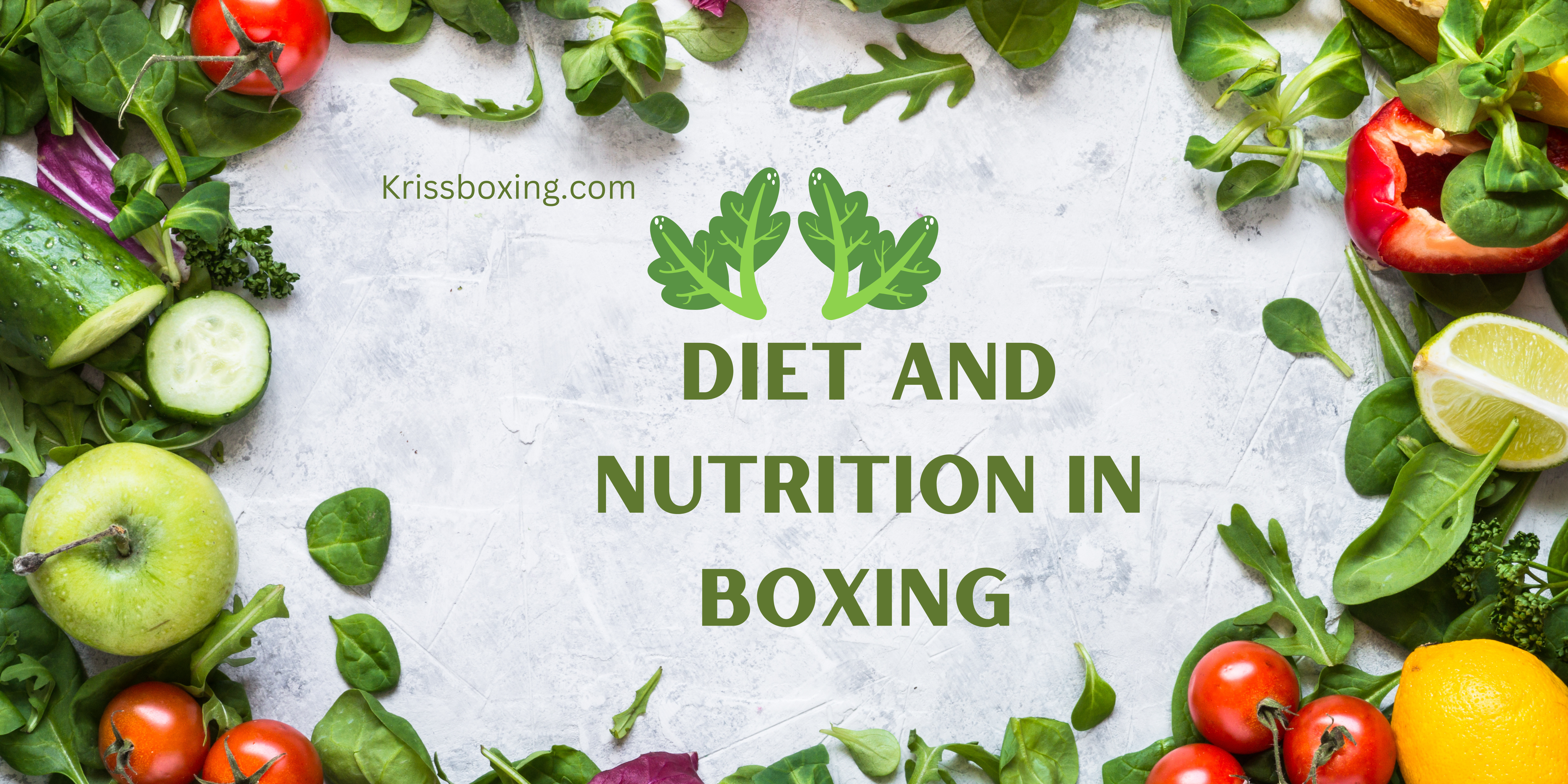Some of the important aspects that are important for a successful journey in the ring depend on diet and nutrition. A proper diet makes a dramatic difference in a boxer’s training, muscle building, and the necessary endurance level necessary to be a champion.
Nutrition supports training sessions, helps with the recovery of fighters, and helps fighters gain weight without having to risk their health.
In this article, we’ll explore how diet and nutrition impact boxing performance, outline essential nutrients for boxers and provide practical dietary tips for optimal results.
How Do Diet and Nutrition Play an Important Role in Boxing
Energy and Endurance
boxing is an extraactive sport that has to be active most of the time. Nutrition guarantees that fighters can endure their workouts and fights because of proper diet.
Weight Management
Boxers are limited with weight categories which they have to maintain. Nutrition also enables one to maintain their weight, build muscles, and retain strength while at it.
Muscle Repair and Recovery
Training poses such a load on the body Training puts a lot of stress on the body. Protein and antioxidants for instance aid in muscle repair and the control of inflammation respectively.
Mental Focus
A well-fueled body is beneficial to coherence, concentration, and hastened decision-making during fights.
Key Nutrients for Boxers
Carbohydrates
Carbohydrates were found to be the muscles’ main nutrient for fueling the movements of the boxers, more so the high-intensity ones.
Examples: Whole grains, sweet potatoes, oats, and fruits includes what have got.
What you should look for is complex carbohydrates which will give you the energy needed through training.
Proteins
Not only for the muscles repair or build-up but also for several other body structures.
Examples: Meat and poultry such as chicken, fish, eggs, tofu, beans and Greek yogurt.
Boxers should gain between 1.2 – 2.0 grams of protein per kilogram of body weight every day.
Fats
Good fats are energy producers and influence hormone production in the long term.
Examples: Avocados, nuts and seeds, and olive oil.
Minimize intake of actual fats of trans fats and increase amounts of beneficial unsaturated fats.
Vitamins and Minerals
Iron: Enhances the transport of oxygen through the bloodstream (available in spinach, red meat, and lentils).
Calcium: Helps to build bones (available in dairies and tofu, green leafy vegetables, and plant-based milk).
Vitamin C: Promotes immune function and healing (present in circles/green veggies like oranges, peppers, and strawberries).
Hydration
Prolonged dehydration has severe effects on performance and also the rate at which the body can recuperate.
It is recommended that before, during, and after the training sessions every boxer should endeavor to take about 2-3 liter of water daily or more when training is intensified.
Sodium and potassium are electrolytes normally known for the ability to regulate water balance while magnesium is equally important in rehydration when one sweats.
Meal Timing for Optimal Performance
- Pre-Workout Meals
Eating 2-3 hours before training one should take a balanced diet from carbohydrates and proteins.
Example: Dry grilled chicken with quinoa and spices steamed vegetables.
- During Training
Always carry a water bottle for yourself and if you are carrying out continuous energy small bananas or energy bars can be taken.
- Post-Workout Meals
Ensure proteins and carbs within half an hour after the training to foster recovery.
Example: A protein shake with a banana or turkey sandwich made from whole-grain bread.
- Daily Eating Schedule
To help keep up high energy levels; consider dividing meals into five or six smaller meals and snacks all through the day.
Special Dietary Considerations for Boxers
Weight Cutting
Boxers need to shed some pounds before the fights. Instead of starving, they should use a systematic diet technique and step up their cardio.
Vegan and Vegetarian Diets
Like with every other population, if carefully observed nutritional planning and balanced diets are followed plant-based diets can also work with boxers.
Supplements
Take supplements such as Whey, creatine, or any multivitamin to supplement what your diet may lack. The application requires advanced consultation with a nutritionist.
Sample 1-Day Meal Plan for a Boxer
Breakfast
That is a bowl of oatmeal with almond butter, sliced banana, and boiled egg.
Mid-Morning Snack
There are a couple of options, like overnight oats and Greek yogurt with mixed berries and a handful of nuts.
Lunch
Deep-fried grilled salmon, steamed brown rice, roasted vegetables, and a side dish of a crisp salad.
Afternoon Snack
Crackers are made from whole grains with beans and carrots.
Dinner
Grilled lean meat, such as beef steak accompanied by steamed sweet potatoes, and broccoli; and a glass of water.
Post-Dinner Snack (Optional)
Sliced fresh peaches with diced cottage cheese or a protein shake of choice.
Frequently Asked Questions to Diet and Nutrition for Boxers
What is the recommended level of hydration for a boxer?
A boxer should take about 2-3 liters of water per day as it is gradually increased during the training session in very hot weather or conditions.
Should a boxer have a high protein low carbohydrate diet?
Boxers depend on meals that are made up of reduced simple glycemic index carbohydrates, lean meats, required fats, vitamins, and minerals
How do boxers safely reduce their weight?
Slow starvation, elevated cardio, and drinking are more effective, yet safer approaches than mere starvation or active dehydration.
Will boxing performance be enhanced by a vegan diet?
Yes, as has been seen, a correctly constructed plant-based diet can offer all the necessary protein and nutrients for boxers.
Finally, what food is bad for boxers?
Junk food and quick snacks should be avoided as they degrade performance and hinder proper muscle recovery.
Conclusion
A boxer’s diet and nutrition are indispensable components of fighting. A balanced nutritional plan for fighters integrated into specific individual characteristics will improve performance, recovery, and overall health whilst the fighters are on the right nutrition plan for their weight class.
In regards to macronutrients, this manner of dieting will help give the necessary fuel for training and fighting through correct meal timing and volume of fluids consumed.



I am constantly impressed by the depth and detail in your posts You have a gift for making complex topics easily understandable
I’ve come across many blogs, but this one truly stands out in terms of quality and authenticity Keep up the amazing work!
I love how your posts are both informative and entertaining You have a talent for making even the most mundane topics interesting
It’s always a joy to stumble upon content that genuinely makes an impact and leaves you feeling inspired. Keep up the great work!
Wow, I had never thought about it in that way before You have really opened my eyes to a new perspective Keep up the great work!
This is exactly what I needed to read today Your words have given me a new perspective and renewed hope Thank you
Your writing is so engaging and easy to read It makes it a pleasure to visit your blog and learn from your insights and experiences
Looking forward to your next post. Keep up the good work!
I’ve come across many blogs, but this one truly stands out in terms of quality and authenticity Keep up the amazing work!
I have been struggling with this issue for a while and your post has provided me with much-needed guidance and clarity Thank you so much
Your writing is so eloquent and persuasive You have a talent for getting your message across and inspiring meaningful change
Your positivity and enthusiasm are infectious It’s clear that you are truly passionate about what you do and it’s inspiring to see
Your passion for what you do is evident in every post It’s inspiring to see someone truly fulfilling their purpose and making a positive impact
Love this blog! The content is always so relevant and insightful, keep up the great work!
Your latest blog post was truly inspiring and had some great insights. I can’t wait to see what else you have in store.
Your honesty and vulnerability in sharing your personal experiences is truly admirable It takes courage to open up and I applaud you for it
Your blog is always a highlight of my day